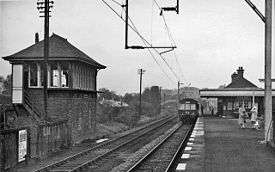Burnside railway station
| Burnside | |
|---|---|
| Scottish Gaelic: Taobh an Uillt[1] | |
|
Looking west towards Croftfoot | |
| Location | |
| Place | Burnside |
| Local authority | South Lanarkshire |
| Coordinates | 55°49′01″N 4°12′11″W / 55.8169°N 4.2030°WCoordinates: 55°49′01″N 4°12′11″W / 55.8169°N 4.2030°W |
| Grid reference | NS620603 |
| Operations | |
| Station code | BUI |
| Managed by | Abellio ScotRail |
| Number of platforms | 2 |
|
Live arrivals/departures, station information and onward connections from National Rail Enquiries | |
| Annual rail passenger usage* | |
| 2012/13 |
|
| 2013/14 |
|
| 2014/15 |
|
| 2015/16 |
|
| 2016/17 |
|
| History | |
| Original company | Lanarkshire and Ayrshire Railway |
| Pre-grouping | Caledonian Railway |
| Post-grouping | LMS |
| 1 August 1904 | Opened[2] |
| National Rail – UK railway stations | |
| * Annual estimated passenger usage based on sales of tickets in stated financial year(s) which end or originate at Burnside from Office of Rail and Road statistics. Methodology may vary year on year. | |
|
| |

Burnside railway station serves the Burnside and Blairbeth areas of the Royal Burgh of Rutherglen, South Lanarkshire, Greater Glasgow, Scotland. The station is managed by Abellio ScotRail and is located on the Newton branch of the Cathcart Circle Lines, which has been electrified since 1962 by British Railways. This is the busiest railway station on the Newton branch.
History
The station was opened by the Lanarkshire and Ayrshire Railway on 1 August 1904.[2] Later taken over by the Caledonian Railway, it became part of the London, Midland and Scottish Railway at the 1923 Grouping and subsequently the Scottish Region of British Railways at nationalisation in 1948. B.R electrified the line through the station in 1962, when the section beyond Neilston was closed - since that time, all services have run to/from Glasgow only, though it became possible to travel there via both sides of the Circle following track alterations in the Carthcart area carried out as part of the modernisation work.
Facilities
Access to this station is by one of two railway bridges and as a result there is no disabled access to trains from here. A single waiting room serves both platforms. The ticket office is only open on Mondays to Saturdays. Customer information screens are also available at this station. A help point is available, like on every other ScotRail station in Glasgow. Automatic announcements have recently been fitted at this station as well as all the stations on the Cathcart Circle. There is no dedicated car park, but six cycle storage places are available.[3]
Services
From 1974
Following the electrification of the West Coast Main Line by British Rail, the basic service was:
- Monday to Saturday
- two trains per hour between Glasgow Central and Kirkhill via Maxwell Park
- two trains per hour between Glasgow Central and Newton via Queen's Park
- Sundays
- two trains per hour between Glasgow Central and Newton via Queen's Park
- Additional peak hour services were provided to Motherwell via both sides of the Hamilton Circle.
From 1979
Following the opening of the Argyle Line in November 1979 by British Rail, services on the Cathcart Circle were reorganised. The basic service was:
- Monday to Saturday
- two trains per hour between Glasgow Central and Newton via Maxwell Park
- two trains per hour between Glasgow Central and Newton via Queen's Park
- Sundays
- two trains per hour between Glasgow Central and Newton via Queen's Park
From 2005
- Monday to Sunday[4]
- one train per hour between Glasgow Central and Newton via Maxwell Park
- one train per hour between Glasgow Central and Newton via Queen's Park
| Preceding station | Following station | |||
|---|---|---|---|---|
| Croftfoot | Abellio ScotRail Cathcart Circle |
Kirkhill | ||
| Historical railways | ||||
| Muirend | Caledonian Railway Lanarkshire and Ayrshire Railway |
Kirkhill | ||
References
Notes
- ↑ Brailsford 2017, Gaelic/English Station Index.
- 1 2 Butt (1995), page 49
- ↑ http://www.nationalrail.co.uk/stations_destinations/BUI.aspx
- ↑ Table 223 National Rail timetable, May 2016
Sources
| Wikimedia Commons has media related to Burnside railway station. |
- Brailsford, Martyn, ed. (December 2017) [1987]. Railway Track Diagrams 1: Scotland & Isle of Man (6th ed.). Frome: Trackmaps. ISBN 978-0-9549866-9-8.
- Butt, R. V. J. (1995). The Directory of Railway Stations: details every public and private passenger station, halt, platform and stopping place, past and present (1st ed.). Sparkford: Patrick Stephens Ltd. ISBN 978-1-85260-508-7. OCLC 60251199.
- Jowett, Alan (March 1989). Jowett's Railway Atlas of Great Britain and Ireland: From Pre-Grouping to the Present Day (1st ed.). Sparkford: Patrick Stephens Ltd. ISBN 978-1-85260-086-0. OCLC 22311137.
- Jowett, Alan (2000). Jowett's Nationalised Railway Atlas (1st ed.). Penryn, Cornwall: Atlantic Transport Publishers. ISBN 978-0-906899-99-1. OCLC 228266687.

